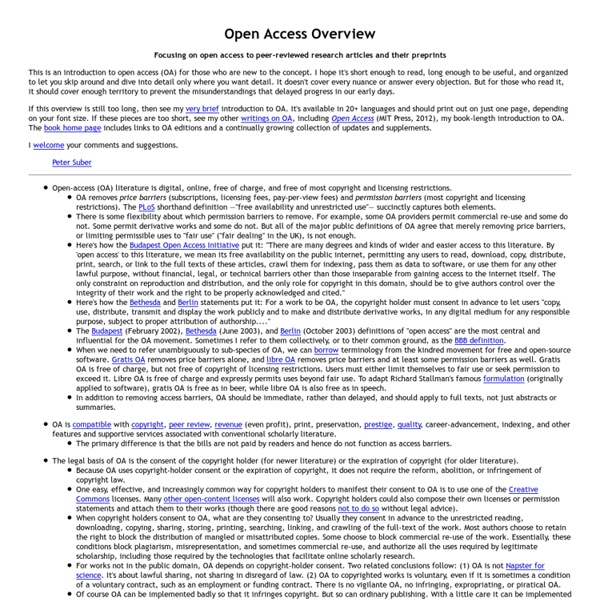



http://legacy.earlham.edu/~peters/fos/overview.htm
Secrecy News The number of chronically homeless persons in the U.S. dropped from more than 120,000 in 2008 to around 84,000 in 2014, a new report from the Congressional Research Service notes. The federal government has undertaken to end chronic homelessness by 2017. “One of the reasons that federal programs have devoted resources to ending chronic homelessness […] Read More The national census in 2020 will be the first to rely primarily on the Internet for collecting census data, thereby creating new avenues for fraud and disruption. A new report from the JASON scientific advisory panel describes the problem and outlines some solutions.
Get Downloading - 20 great GLAM websites for free high resolution images People often ask me where they can find images of collection items that they can reuse for free. There is no single website hosting all of the reusable images available so I thought I’d list my favourite galleries, libraries, archives, and museums (GLAMs) that make at least some images of their collections freely available for reuse. If you’ve got a spare 5 minutes go and have an explore. Te Papa, 106,000+ images Top of my list is, of course, Te Papa. CIA Accountability Hits New Lows - Fir In a virtually unnoticed exchange on February 3, Congressman Peter Hoekstra (R-MI) called the CIA to task for its incredibly ham-fisted handling of an April 20, 2001 incident in Peru. In collaboration with a CIA aircrew working as part of a joint program to interdict drug trafficking, the Peruvian air force shot down a plane carrying an American missionary family, killing two. In an angry tone, the Republican congressman denounced the CIA’s response, released the actual film of the incident, and triggered an official statement from the agency — conveniently left off the CIA website to attract as little attention as possible. This episode is important as part of the continuing effort to bring accountability to CIA operations.
Where to find free stock photos – PINEAPPLE GLAM I am a visual person who loves colour, vibrancy and quirky images. If you want me to read something, follow something, attend something or buy something then you have to make it pretty! So let’s talk about where you can find free stock images for all your social media, web and print needs that will help you make everything pretty! Remember, there is absolutely no reason why you should be using images that you do not have permission to use. Never save something directly off the internet without knowing where it came from and who owns the copyright. If you have more questions about when and how you can use images I recommend you read Photographers & Copyright by the Australian Copyright Council. Clinton PDDs and PRDs I somehow missed the fact that the Clinton Library has posted online six declassified Presidential Decision Directives (PDD) and two Presidential Review Directives, most of which involve nuclear weapons, ballistic missile defense and space policy. PDD-17: U.S. Policy on Ballistic Missile Defenses and the Future of the ABM Treaty PDD-23: US Policy on Foreign Access to Remote Sensing Space Capabilities PDD-25: U.S.
Declassified/Released Document Collections Keystone Pipeline Project Ronald Reagan’s June 12, 1987 Speech at the Brandenburg Gate Korean Air Flight 858 February 15, 2006 draft memorandum by Counselor of the Department Philip Zelikow Re: The McCain Amendment and U.S. Obligations under Article 16 of the Convention Against Torture Frequently Requested Contracts Rwandan Declassification Collection Repost: How to Decipher a State Department Cable (FOIA Tip #2) This guide –originally written by Kristin Adair– might come in handy as you peruse the 251,287 Department of State cables recently released by wikileaks. [As of today only 243 cables are available on the wikileaks site] At the Archive, we have lots of practice reading declassified government documents.
SAUDI ROYAL WEALTH: WHERE DO THEY GET ALL THAT MONEY? Viewing cable 96RIYADH4784, SAUDI ROYAL WEALTH: WHERE DO THEY GET ALL THAT MONEY? Understanding cables Every cable message consists of three parts: The top box shows each cables unique reference number, when and by whom it originally was sent, and what its initial classification was. The middle box contains the header information that is associated with the cable. It includes information about the receiver(s) as well as a general subject.
08LONDON2233 Viewing cable 08LONDON2233, S/NF) UK CONSIDERING ENGAGEMENT WITH HIZBALLAH MINISTER, POLITICAL OFFICIALS REF: A. NEA/ELA-EMBASSY LONDON EMAILS B. LONDON 1396 C. LONDON 1292 D. LONDON 1968 Understanding cables Every cable message consists of three parts: U.S.-Chile Documents By Peter Kornbluh National Security Archive Electronic Briefing Book No. 8 For more information contact: Peter Kornbluh 202/994-7000 or nsarchiv@gwu.edu Washington, D.C. – September 11, 1998 marks the twenty-fifth anniversary of the military coup led by General Augusto Pinochet. The violent overthrow of the democratically-elected Popular Unity government of Salvador Allende changed the course of the country that Chilean poet Pablo Neruda described as "a long petal of sea, wine and snow"; because of CIA covert intervention in Chile, and the repressive character of General Pinochet's rule, the coup became the most notorious military takeover in the annals of Latin American history. Revelations that President Richard Nixon had ordered the CIA to "make the economy scream" in Chile to "prevent Allende from coming to power or to unseat him," prompted a major scandal in the mid-1970s, and a major investigation by the U.S.
Peter Suber defines Open Access (from 2004 and revised 2013) in a textbook manner peppered with links of OA journals and organizations. by katrinahsmith Mar 4